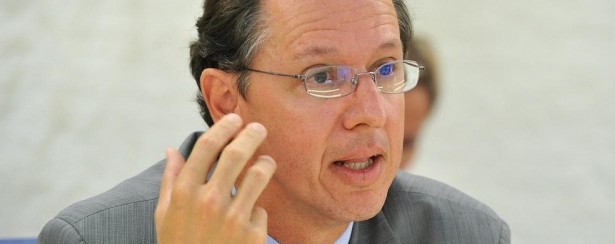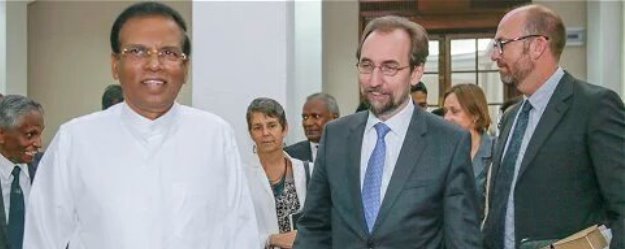
The visit of UN High Commissioner for Human Rights Zeid Ra’ad Al Hussein went more smoothly than expected for the government. The weeks before the visit of the High Commissioner had seen President Maithripala Sirisena and Prime Minister Ranil Wickremesinghe making apparently contradictory statements on the issue of international participation in the post-war reconciliation mechanisms, especially in relation to the judiciary and accountability. This led to concern about the possibility of the government backtracking on the commitments it had made as a co-signatory to the UNHRC resolution in Geneva in October 2015. There was also concern that the visiting UN dignitary would be critical of the government’s approach to the post-war reconciliation process while in the country.
High Commissioner Zeid’s critical comments during his stay in Sri Lanka on the politicization and failures of the Sri Lankan judiciary prompted angry rebuttals in Sri Lanka and also led to the inference that he was making the case for international participation in the accountability process. A fixed and narrow position on this issue by the international community will place the government in a difficult position. The core of the political opposition to the transitional justice process within the country is the concern that the international community is eroding the country’s sovereignty with its insistence on the participation of foreign and Commonwealth judges, prosecutors and investigators as specified in the UNHRC resolution. It is this issue that the political opposition is likely to capitalize in order to weaken the government.
The sense of nationalism within the Sri Lankan polity cannot be underestimated. The identity of the Sinhala people has been shaped by the historical memory of the struggles of the past two millennia in which the predominance of the Buddhist religion and the political independence of the island’s kingdoms were eroded and lost due to the depredations of different waves of foreign invaders, from India in the early millennia to the Western colonial powers in the last 500 years. On the other hand, this nationalism is not limited to the Sinhala people. It also finds its expression in the memory of the Tamil people that three independent kingdoms existed at the turn of the 16th century when the first of the Western colonial powers visited the island’s shores. There is a need to find an appropriate balance between these two strong ethnic-based nationalisms.
Stoking Nationalism
During a discussion on the reconciliation process that took place in Hambantota last week in which I participated, the issue of singing the national anthem in the Tamil language came up. The government’s decision to have the 68th Independence Day celebrations end with the singing of the national anthem in the Tamil language came as a surprise to most people. This was an issue that had been canvassed even during the period of the past government by the former minister of national languages Vasudeva Nanyakkara, who is today one of the key leaders of the Opposition. But not even his efforts could get the former government to agree to this practice. However, the unexpected way in which the national anthem was sung at the Independence Day celebrations came in for much praise and commendation by liberal sections of the population.
The last time the national anthem was sung in the Tamil language at a national day event was in 1949 when the newly independent government celebrated independence from British colonial rule for the first time. The Tamil anthem is an exact translation of the Sinhala version, sung to the same tune. But the anthem was previously only sung in Tamil in the Tamil-dominated north and east of Sri Lanka. In Hambantota, which is the home district of former President Mahinda Rajapaksa, the issue of the national anthem being sung in Tamil on the occasion of the 68th Independence Day events in Colombo was not generally positive. A medical doctor serving in the area said that most of his colleagues were not in favour of this new practice. It was also mentioned that a study had shown that the level of ignorance about other communities is so high, that many schoolteachers do not even know that Tamil is an official language, and has been one since the passage of the 13th Amendment in 1987.
In that context when the national anthem is sung in the Tamil language it came as a shock to the people in Hambantota, and probably elsewhere, and is seen as yet another anti-national initiative to appease the international community. Former President Mahinda Rajapaksa criticised the decision to sing in Tamil saying the anthem should be sung in one language only. He said that even in India where many languages are spoken, the national anthem is sung in only one language. There is a need to educate people that national anthems are not sung in only one language as a rule, and there are many countries in which it is sung in more than one language. These include countries as different as New Zealand, South Africa and Canada. It is also necessary to point out that in India it is sung in the Bengali language, and not in the largest language, Hindi.
POLITICAL STABILITY
In view of the nationalism that continues to be stoked by the opposition, it also necessary for the government to take steps to communicate to the people the outcome of the visit of the UN Human Rights High Commissioner. This needs to take the form of a campaign led by the government or else the initiative will go to the opposition by default. The opposition claims that the government betrayed the country and its armed forces by co-sponsoring the UNHRC resolution in October last year. However, the UN system is now making it clear that so long as Sri Lanka is taking steps to address the issues in the resolution, it need not act according to time tables set by others. The internationally driven reform project cannot supersede the need to stabilize the policy shift that has taken place in the country since the election of the National Unity Government. It is the government that has to take primary responsibility for the process on which it has commenced, and to which it has signed its willingness.

UN Special Rapporteur on Truth, Justice, Reparation and Guarantees of Non-Recurrence Pablo de Greiff, who has been appointed as an international adviser to the civil society consultation process, has said that Sri Lanka should not be hasty in trying to meet its commitments to the UN Human Rights Council in regard to issues of transitional justice. He has said, “There is no country that can accomplish all this is a short period of time. Sri Lanka has embarked on an ambitious process that should not be prepared, let alone implemented, in haste,” in the report on his visit to Lanka between January 26 and February 1, which was released on last week. The ultimate success of the reconciliation process matters more than its speed.
The UN Human Rights High Commissioner Al Hussein, at the conclusion of his visit, said in a cautiously worded statement that “the resolution suggests international participation in the accountability mechanisms set up to deal with international crimes and gross human rights violations by individuals on both sides.” By co-sponsoring the UNHRC resolution the government is now entrusted with the task of determining the meaning of international participation and the degree of international involvement. There are many degrees of international participation, ranging from being decision makers, to joint decision makers to being advisers and observers, and at different points of the transitional justice process. The government’s calculation about how far it can go at this time, and how quickly, in the face of political realities and the need to preserve its stability is likely to take centre stage.
-Courtesy The Island
